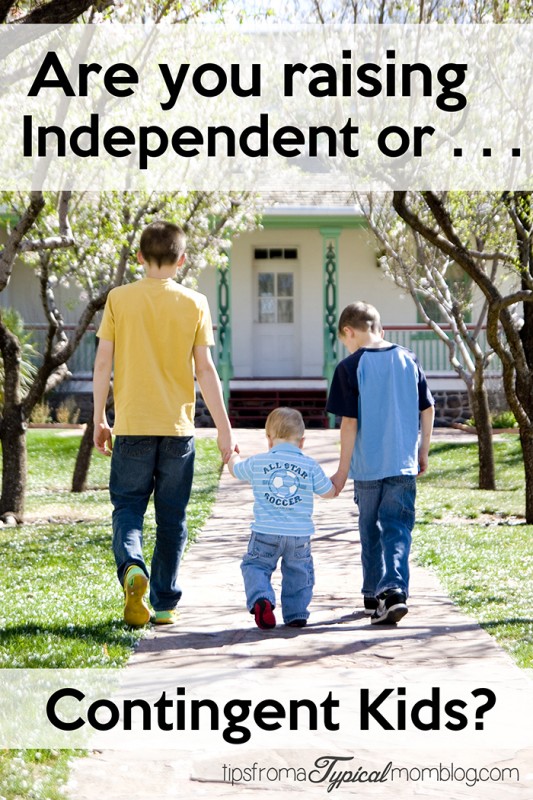A parents number one priority when raising their children is to focus on raising children who will be able to take care of themselves when they leave home. We hope we are raising children to be kind, empathetic, successful, and happy adults. And the only way to do that is to teach them how to do things for themselves.

Obviously when our kids are small they depend on us for everything. But as our children grow they become less and less dependent on us and start learning how to do things for themselves. This is something we should embrace in our children. I know sometimes parents aren’t happy about their kids growing up and want to keep doing things for them. We don’t realize that we are hurting our kids by doing everything for them. When our children reach adolescence they still need our love and guidance, but they also need to learn how to do things for themselves and they feel satisfaction about accomplishing things on their own.
If we as parents don’t stop doing everything for our children we will be raising contingent children rather than independent children.
So what’s the difference between contingent children and independent children?
Contingent children have parents that enjoy doing every little thing for them. Not only physical needs but emotional needs are met through the parent. Contingent children depend on others for motivation to achieve anything. These children depend on others for their own happiness because nothing they have achieved as been their own. These children’s behavior is rewarded inappropriately because they have no limits set. These children feel like they make poor decisions because their parents always feel like they know what’s best for the child.
Independent children are confident and believe that they are capable of taking care of themselves. These children’s parents have guided them when making decisions, they don’t make decisions for them. Independent children are self motivated because they are allowed to find their own reasons to achieve. These children have been allowed to consider various options and with the help of their parents, make informed decisions.
When it comes to raising kids, it’s good to know what each person’s responsibilities are. If family members fulfill their own responsibilities and do not assume others’, then children develop into independent people and everyone is happy (Taylor’s Law of Family Responsibilities).
A Parent’s Responsibility
Parents should provide their children opportunities to make decisions. Parents should help guide their children to make good decisions with love and encouragement. Parents should instruct children so their children will make good decisions.
A Child’s Responsibility
Children are responsible for using the freedom their parents give them while at the same time being responsible for their own decisions. Children should respect the discipline their parents enforce and cooperate with their parents. Children should also show appreciation for others’ help and advice.
How to Raise Independent Children
The only way you can expect your child to be responsible is to make sure your child knows what their responsibilities are.
This is THE most important thing to do when raising independent children.
Hold a family council and talk to your children about the fact that they will be taking on more responsibilities. This is when you will make a list of the child’s responsibilities around the home (chores). Obviously there will be different responsibilities for each child since they are all different ages. There are some things an 11 year old can do that a 5 year old can not. So make sure you are being fair. I have a list of responsibilities divided by age to help you out HERE. Make sure your child is given the correct tools to accomplish what you are asking of them. Teach them how to do their jobs the right way so they know what is expected of them. You can’t expect a child to know how to properly mop a floor if they’ve never been taught how to do it, right?
After giving them their responsibilities around the home, ask your child to set goals for other things in their lives. Do they want to learn how to do something new? Do they want to get better at a certain hobby? Help them set obtainable goals and then come up with a game plan to help them achieve those goals. You are there as a support system, NOT doing the work for them.
When your children have established their sense of security, you must then encourage them to explore the world beyond the safety net that you provide. This “push out of the nest” allows your children to test their own capabilities in the “real world” and to find a sense of competence, security, and independence within themselves.
Making Your Child Accountable
You need to set consequences for the children if they don’t complete their responsibilities. I’ve learned that taking something away from the child and having them earn it back is the best form of punishment. The child understands the consequences for their actions and they learn how to resolve the issue. You need to decide how and when they can earn it back. Make sure you talk through each punishment, but do NOT lecture. Then briefly tell them how they can earn it back.
I know that there are many parents out there that think it’s OK to coddle their kids and make their kids feel like nothing is their fault. This is not healthy behavior. Children need to be held accountable for their actions. This is a critical part of becoming independent. If there are no consequences for the child’s actions, they will not learn how to fix problems and make things right.
Most parents think that they are protecting their children from hurt by making it seem like nothing is their fault when in reality they are hurting them more by sugar coating everything. If a child is coddled all of their lives at home, how are they going to handle disappointment and failure out in the real world?
It is crucial for your child to still feel loved and accepted when they fail. Words like “We all fail, this is how we learn to do things right.” or “You did ________ wrong, but you did _______ right!” and “It’s OK to make mistakes, this is how we learn to make better decisions. So let’s work together on how to make this better.”

Encouraging Exploration
When children start realizing that they have a power that is separate from their parents, they start to discover what this power feels like. Kids start exploring their world in an active way. This exploration leads the child to a sense of autonomy; the belief that they have the power to do things by themselves
From the time your child is a toddler, they try to figure out how far they can push their boundaries. This is where the guiding hand of the parent comes in. It’s very important that a child is not shamed for exercising this power. It’s a fine line between thinking “what I am doing is wrong”, to “I am wrong for doing it.”
Parents who respect children’s ideas help them learn to think and solve problems for themselves. Children who feel free to make mistakes and to explore and experiment will also feel free to invent, create, and find new ways to do things. Grant the lasting gift of freedom to children—to make mistakes and learning from doing.
Encourage your child to explore their options and experiment with decision making. This way we will be raising successful, contributing adults that will hopefully make this world a better place.
The side benefit to raising an independent child is that fostering independence in our home makes parenting more rewarding and fun and gives children a zest for imagining and learning to last a lifetime.


I love this!!! I see kids and adults who have issues because of this all the time Great information! Thanks Annette
Great information! Thanks Annette 
You’re welcome Amberly!
Hmmmm. I’ve tried SO hard to make my youngest son that independent type of kid, but I don’t think I’ve done a great job with him. My problem is that I’m too much like my Mom – too much of a pushover on really buckling down on him when he skips chores or does a lousy job on them (a chronic problem). I really wish I’d done these things when he was 10 and 12 because now that he’s 17, it seems like I’m going to have a hard time getting him on track to be able to manage on his own some day.
That’s the hard thing Adrian. Following through with punishments. I’ve gotten worse at following through the older I get, so I need to get back to making the kids accountable. Thanks for your comment!